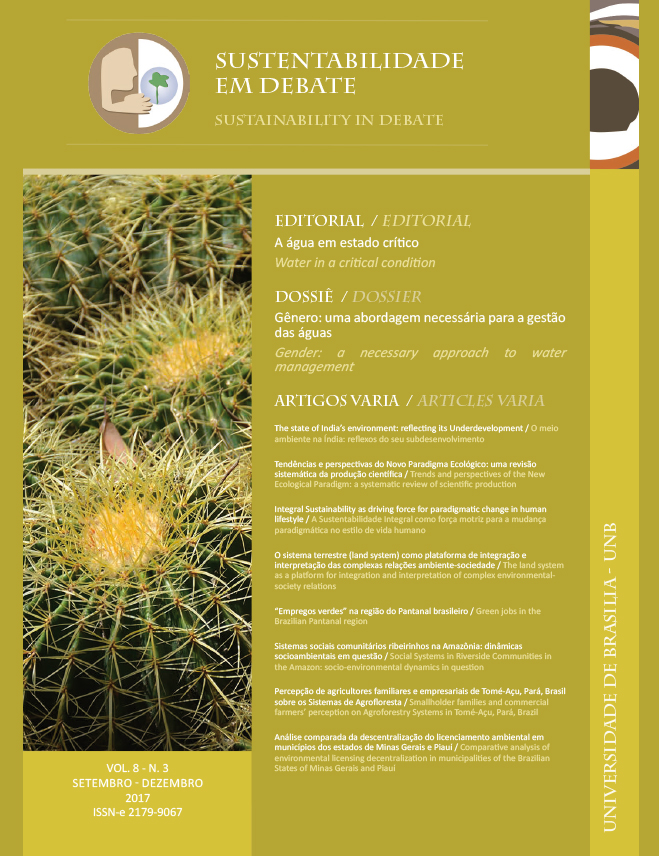Mainstreaming of the gender perspective in water management:
lessons learned from Chiapas, Mexico
DOI:
https://doi.org/10.18472/SustDeb.v8n3.2017.26474Keywords:
Chiapas, Gestão da Água, Igualdade de Gênero, Direitos à Água, Gênero e Meio AmbienteAbstract
In the paper I present the findings and learning derived from my research and my experience of incidence to incorporate the gender approach in water management, in Chiapas, south of Mexico. First, I present the linkages between gender and water management and the theoretical references that guided my research. Subsequently, the characteristics of sectoral and androcentric management of water are analyzed, and the position of inequity that rural women live to gain access to control of their rights to water. Findings and obstacles are presented as lessons learned. It concludes with a brief reflection on the challenges and alternatives for change that exist based on the struggles of women's movements.
Downloads
References
AHLERS, R. and Zwarteveen, M. The water question in feminism: water control and gender inequities in a neo-liberal era, Gender, Place & Culture, 16:4, 409 ”” 426, 2009.
ALDA-VIDAL, C.; RUSCA, M.; ZWARTEVEEN, M.; SCHWARTZ, K & Pouw, N. Occupational genders and gendered occupations: the case of water provisioning in Maputo, Mozambique, Gender, Place & Culture, 2017.
BAYONA, E. Las mujeres en la sierra: ámbitos de pobreza y desigualdad de género. Serie Mujeres marginales de Chiapas: situación, condición y participación, CESMECA-UNICACH, Chiapas, 2011.
BECCAR, L., BOELENS, R. y HOOGENDAM, P. Derechos de agua y acción colectiva en el riego comunitario, En Boelens, R. Hoogendam, P. Derechos de Agua y Acción Colectiva. Instituto de Estudios Peruanos, Lima, pp. 21-46, 2001.
BRAIDOTTI, R. Women, the Environment and Sustainable Development. Towards a Theoretical Synthesis. Zed Books. London, 1994.GLOBAL WATER PARTNERSHIP. Towards Water Security: A Framework for Action. Stockholm, Sweden, 2000.
GENDER AND WATER ALLIANCE, Effective gender mainstreaming in water management for sustainable livelihoods: From guidelines to practice Both ENDS Working Paper Series. Amsterdam, 2006.
INEGI. Censo Agropecuario 2007, IX Censo Ejidal, 2008, Aguascalientes, México. 2008.
LEACH, M., JOEKES, S. y GREEN, C. Editorial: Gender Relations and Environmental Change, Institute of Development Studies Bulletin, Vol. 26, No. 1. University of Sussex, Brighton, UK. 1-8, 1995.
MONSALVE S. Gender and land. En Rosset, P., Patel, R. y Courville, M. (Eds.). Promised Land: Competing Visions of Agrarian Reform, pp. 192-207, 2006 Oakland: Food First Books. Disponible en: http://www.foodfirst.org/files/bookstore/pdf/promisedland/10.pdf WIENS, P. Naturaleza de género de los arreglos institucionales locales para la gestión de recursos naturales (GRN). Una brecha crucial en el conocimiento para promover una GRN equitativa y sustentable. Inédito. http//:www.network.idrc.ca. 2002.
WORLD WATER COUNCIL. Visión Mundial del Agua. Earthscan Publications Ltd. London, 2000.
ZWARTEVEEN, M. & BENNETT, V. The Connection between Gender and Water Management, en: Bennett V., S. Dávila-Poblete y M. N. Rico (ed.) Opposing Currents. The Politics of Water and Gender in Latin America, University of Pittsburgh Press. pp. 13-29, 2005.
ZWARTEVEEN, M. Men, Masculinities and Water Powers in Irrigation, Water Alternatives 1(1): 111-130, 2008. Disponible para World Wide Web: http://www.water-alternatives.org.
Downloads
Published
How to Cite
Issue
Section
License
SUSTAINABILITY IN DEBATE – Copyright Statement
The submission of original scientific work(s) by the authors, as the copyright holders of the text(s) sent to the journal, under the terms of Law 9.610/98, implies in the concession of copyrights of printed and/or digital publication to the Sustainability in Debate Journal of the article(s) approved for publication purposes, in a single issue of the journal. Furthermore, approved scientific work(s) will be released without any charge, or any kind of copyright reimbursement, through the journal’s website, for reading, printing and/or downloading of the text file, from the date of acceptance for publication purposes. Therefore, the authors, when submitting the article (s) to the journal, and gratuitous assignment of copyrights related to the submitted scientific work, are fully aware that they will not be remunerated for the publication of the article(s) in the journal.
The Sustainability in Debate Journal is licensed under Creative Commons License – Non-Commercial-No-Derivation Attribution (Derivative Work Ban) 3.0 Brazil, aiming at dissemination of scientific knowledge, as indicated on the journal's website, which allows the text to be shared, and be recognized in regards to its authorship and original publication in this journal.
Authors are allowed to sign additional contracts separately, for non-exclusive distribution of the works published in the Sustainability in Debate Journal (for example, in a book chapter), provided that it is expressed the texts were originally published in this journal. Authors are allowed and encouraged to publish and distribute their text online, following publication in Sustainability in Debate (e.g. in institutional repositories or their personal pages). The authors expressly agree to the terms of this Copyright Statement, which will be applied following the submission and publishing by this journal.








